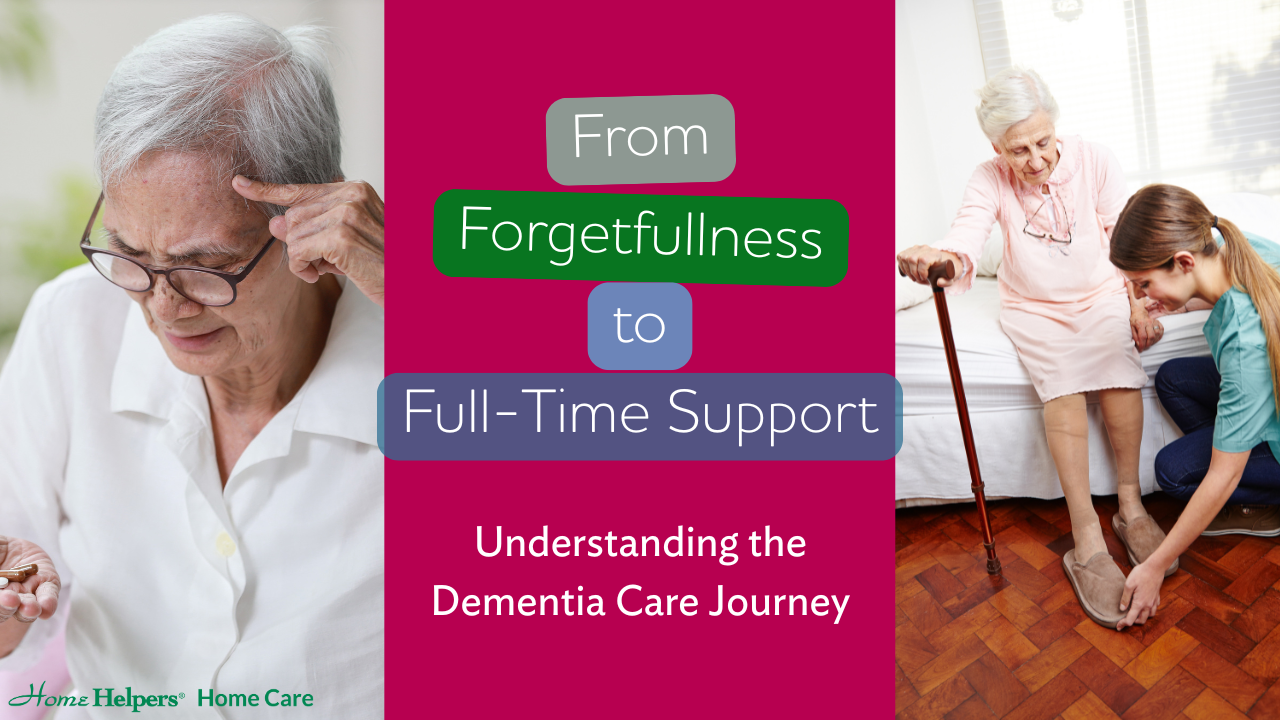From Forgetfulness to Full-Time Support: Understanding the Dementia Care Journey

Author: Home Helpers Home Care
The journey through dementia is deeply personal and emotionally complex. What begins as simple forgetfulness can gradually transform into a full-time caregiving role that demands emotional resilience, education, and constant adaptation. Understanding the evolution of dementia helps families in Hagerstown and Frederick better anticipate changes, plan ahead, and provide care that supports dignity and comfort.
In communities like Hagerstown, MD—where family ties run deep and multigenerational households are common—and Frederick, known for its vibrant aging population and community-based health initiatives, dementia care is a growing concern. With local hospitals like Meritus Health and Frederick Health offering memory care resources, many families find themselves navigating care decisions while balancing work, caregiving, and emotional stress.
Early Stage: The Subtle Signs
Early dementia symptoms are often mistaken for normal aging. These can include difficulty recalling names, repeating questions, or forgetting recent conversations. While mild, these signs may disrupt routines and relationships, prompting families to seek answers. A medical diagnosis from a local neurologist or memory clinic is key to confirming dementia and beginning care planning.
In this stage, it’s important to start documenting changes and communicate openly with loved ones. Providers at local practices such as Frederick Neurology or Meritus NeuroScience Center can assist with cognitive evaluations. With a diagnosis in hand, families can begin planning for future care needs, including financial and legal considerations.
Middle Stage: Shifting Roles and Rising Needs
As dementia progresses, symptoms become more pronounced. Daily tasks like managing medications, preparing meals, or navigating familiar spaces become difficult. Loved ones may repeat stories, lose track of time, wander, or experience mood swings. Caregivers often find themselves assuming new responsibilities—from overseeing medical appointments to helping with hygiene.
At this stage, safety becomes a primary concern. Home modifications such as grab bars, clear signage, and door alarms can help prevent accidents. Many families in Washington and Frederick counties benefit from professional in-home care to assist with daily activities and provide respite to overwhelmed caregivers. Routine becomes especially important, as familiar patterns can reduce anxiety and confusion.
Home Helpers caregivers serving Hagerstown and Frederick are trained to recognize behavioral changes and provide personalized support. Whether it's a few hours a day or round-the-clock care, their presence helps maintain consistency and ease family stress.
Late Stage: Full-Time Support
Advanced dementia brings significant cognitive decline, mobility issues, and increased dependency. Verbal communication may diminish, and individuals often require help with eating, bathing, and toileting. Risk of infections, falls, and malnutrition increases substantially.
Care at this stage is physically and emotionally demanding. Full-time care is often necessary—either through a trained family caregiver or a professional caregiver experienced in dementia. Comfort care, such as music therapy, hand massages, and sensory engagement, becomes essential in providing emotional reassurance and quality of life.
In-home dementia care allows seniors in Hagerstown and Frederick to remain in the comfort of familiar surroundings—close to local parks, churches, and family—while receiving personalized support. Our caregivers are equipped to monitor health conditions, support mobility, and provide daily personal care with compassion.
Planning for the Journey
The most effective dementia care is proactive. Creating a care plan that evolves with the individual’s condition is critical for maintaining dignity and stability. That includes:
- Early legal and financial planning (e.g., powers of attorney, living wills)
- Advance care directives
- Identifying preferred living arrangements and support systems
- Researching care options (e.g., respite, 24-hour care, memory care programs)
- Attending local caregiver support groups through Frederick County Senior Services or the Alzheimer’s Association of Greater Maryland
Dementia doesn’t just affect the person diagnosed—it transforms the entire family. Recognizing that you don’t have to face this alone can make a world of difference.
When to Seek Help
If your loved one is:
- Struggling with basic hygiene, meals, or medications
- Wandering or getting lost around familiar areas like Downtown Frederick or local neighborhoods in Hagerstown
- Becoming increasingly agitated, anxious, or aggressive
- Unable to recognize family members or surroundings
... it may be time to consider professional support. In-home dementia care allows your loved one to remain in their community while receiving compassionate, personalized care.
Final Thoughts
Caring for someone with dementia is not a one-size-fits-all journey. It evolves. And so should your support system. From early forgetfulness to full-time care, each stage presents unique challenges—but also opportunities for connection, love, and meaning.
If you're navigating dementia care in Hagerstown or Frederick, Home Helpers Home Care is here to walk with you every step of the way. Our trained dementia caregivers offer expert support tailored to your loved one’s changing needs.
Call us today at (240) 513-6856 or visit Home Helpers Home Care of Hagerstown & Frederick to schedule a free in-home consultation.
References
- Alzheimer's Association. (2024). Stages of Alzheimer's. https://www.alz.org/alzheimers-dementia/stages
- Mayo Clinic. (2023). Alzheimer's disease care planning. https://www.mayoclinic.org/diseases-conditions/alzheimers-disease/in-depth/alzheimers/art-20047780
- National Institute on Aging. (2022). Caring for a person with Alzheimer’s disease. https://www.nia.nih.gov/health/caregiving
